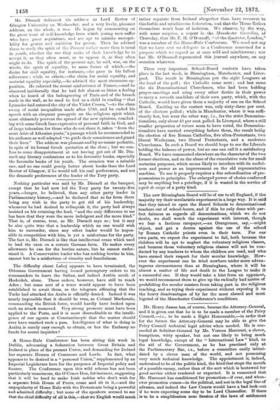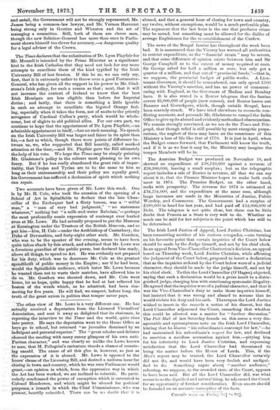Mr. Henry James has, of course, become the Attorney-General, and
it is given out that he is to be made a.--member of the. Privy Council, i.e., to be made a Right Honourable,—in order that for the future the Attorney-General may be able tb give the Privy Council technical legal advice when needed. He is suc- ceeded ak Solicitor-General by Mr. Vernon Harcourt, a clever, bumptious, witty speaker, but not one likely to bring much legal knowledge, except of the " International Law" kind, to the aid of the Government, as he has practised only at the Parliamentary Bar, i.e., before a committee easily intimi- dated by a clever man of the world, and not possessing very much technical knowledge. The appointment is, indeed, understood to be of the politic kind, the kind that stops the month of a possible enemy, rather than of the sort which is bestowed for good service either rendered or expected. It is rumoured that Mr. Harcourt has conditioned for promotion—if ever, and when- ever promotion comes—in the political, and not in the legal line of advance, and indeed the Law Courts would have a bad look-out if he were expecting some day to be Lord Chancellor. If there is to be a simplification near, Session of the laws of settlement
and entail, the Government will not be strongly represented, Mr. James being a common-law lawyer, and Mr. Vernon Harcourt being strong only in Grotius and Wheaton and the art of managing a committee. Still, both of them are clever men, though the new Solicitor-General has more than once in Parlia- ment shown himself too clever for accuracy,—a dangerous quality for a legal adviser of the Crown.



































 Previous page
Previous page